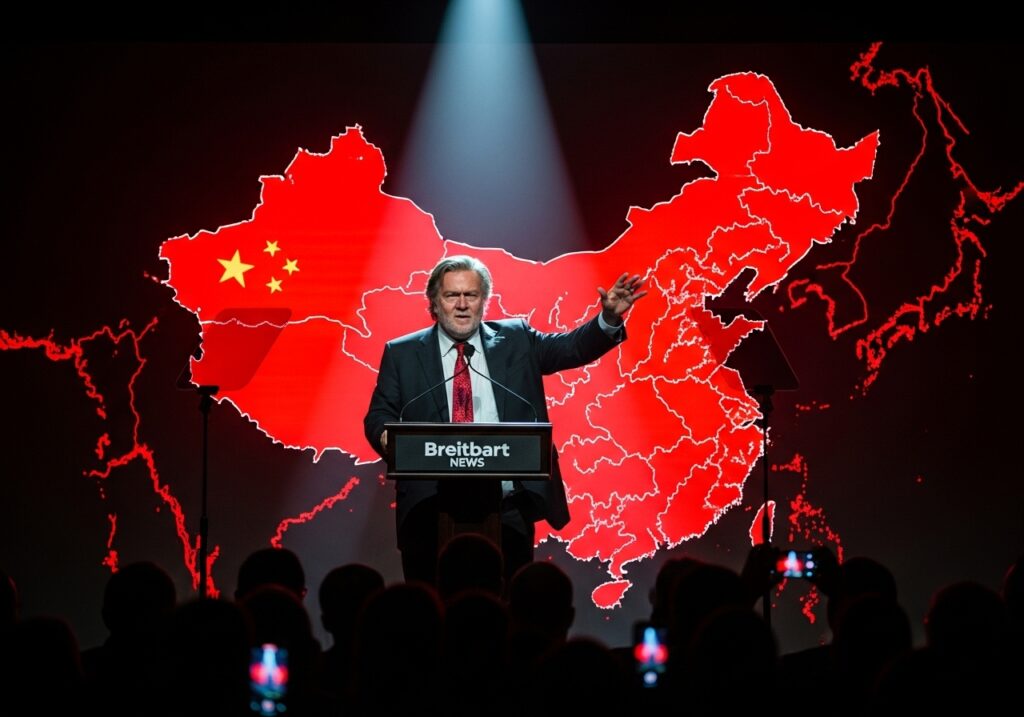Stephen K. Bannon, former top adviser to President Trump and current host of the “WarRoom” podcast, delivered a blunt warning at a recent national conference: China is the greatest external threat the United States faces today. Everything else, he said, is a distraction.
At the National Conservatism Conference in Washington, D.C., Bannon made the case that America is already in the early stages of World War III. But unlike past wars, this one isn’t being fought with tanks on European soil. It’s being fought with trade, technology, and influence. And its main front is not in Ukraine or the Middle East—it’s in Asia, with Communist China leading the charge.
According to Bannon, the dangerous rise of China didn’t happen overnight. It was built over decades, with help from American political and business elites. After the Tiananmen Square crackdown in 1989, many believed the Chinese Communist Party (CCP) was on the verge of collapse. Instead, Bannon says, the West—especially the United States—gave China the tools to grow stronger. He blames both Democrats and Republicans, including figures like Senator Mitch McConnell, for allowing China to gain economic and military power at America’s expense.
For years, American companies moved their factories to China to save on labor costs. In turn, the U.S. lost millions of good-paying manufacturing jobs. At the same time, Chinese students and researchers were welcomed into American universities, gaining access to cutting-edge technology. Many of them returned home, taking that knowledge with them to strengthen the CCP’s military and surveillance state.
All of this, Bannon argues, has led to a moment of crisis. China, along with Russia, Iran, and North Korea, no longer fears the United States. These countries are now working together more openly than ever, forming what Bannon calls a new Axis of power. Their goal is to weaken the West and replace America as the world’s leader.
Bannon believes that under President Trump, the U.S. finally began to push back. Trump’s tariffs on Chinese goods, efforts to bring jobs back to America, and his call to decouple from China were all steps in the right direction. But more needs to be done—and fast.
First, Bannon says, the U.S. must stop getting dragged into conflicts that don’t serve our national interest. He singled out the war in Ukraine, calling it a European problem that America can no longer afford to bankroll. While tragic, the war has drained U.S. resources and distracted from the bigger threat in Asia.
Second, he says the U.S. must cut off China’s energy lifeline. Right now, Iran supplies up to 80% of China’s oil. If the U.S. and its allies can stop that flow, China’s economy and military buildup will suffer. That would also weaken the radical regime in Tehran, which continues to fund terrorism in the region.
Third, Bannon recommends sending Chinese nationals who are studying or working in sensitive tech fields back to China. While not all of them are threats, the CCP relies heavily on foreign-trained experts to maintain its edge in artificial intelligence, cyber warfare, and other critical areas.
Lastly, Bannon warns that the threats to American allies like Israel are real—but they’re symptoms of a broader problem. Radical ideology is spreading in Western cities, not just in the Middle East. The real solution, he says, is to focus on the source—the growing global power of the CCP and its allies.
Bannon’s message is clear: China is not just another competitor. It is an existential threat to American liberty, prosperity, and national survival. If the United States wants to stay free and strong, it must stop feeding the enemy and start defending its own interests.
This is not a distant problem. It’s not something for the next generation to worry about. It’s happening now. And the decisions we make today will shape whether America remains the world’s leading power—or becomes just another fallen empire, brought down by its own short-sighted leaders.

